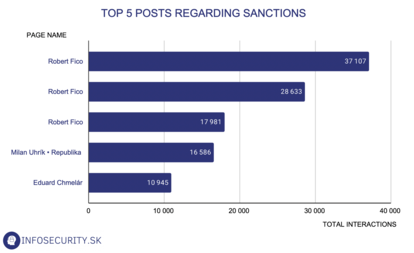DISINFORMATION
Pro-Russian disinformers blame European sanctions for high energy prices

With winter approaching, gas supplies have become an increasingly discussed issue. Various questions are being addressed - whether we have enough gas in storage, whether we will be able to manage after the gas supply from Russia is cut off, and, above all, how much it will cost and whether people will be able to afford it. The uncertainty and frustration in society are being exploited by pro-Kremlin actors whose sole aim is to put pressure on politicians to oppose European sanctions on Russia.
Infosecurity.sk presents an overview of disinformation trends that have been on the rise in information space in the past two weeks:
- Although Putin and his war in Ukraine are responsible for the energy price spikes, disinformation actors are trying to blame the governments of EU members.
- Russia started cutting gas supplies to Europe even before the outbreak of the war in Ukraine, and it is still doing that at present. Putin is using energy supplies to blackmail the EU.
- When criticizing anti-Russian sanctions, disinformation actors try to arouse emotions among the people, for example, by claiming that we will freeze and starve in winter.
- The narrative that the US benefits from sanctions is still present. According to the disinformers, the imposition of sanctions by European leaders was supposed to be a plan by the US to use the war in Ukraine for its own interests.
- Various political actors have been the most active in spreading disinformation about sanctions. They try to influence public opinion with different intentions, for example, for political gain.
Who is to blame for energy prices?
Disinformation actors are blaming high energy prices on anti-Russian sanctions. This narrative can be found in the statements of former Prime Minister Robert Fico and other representatives of the Smer-SD party, but also in case of smaller pro-Putin influencers and even on conspiracy theory websites.
Putin is failing to act in Ukraine as he might have expected; therefore, he is creating an energy crisis. Through it, he is trying to turn public opinion in European countries, lift sanctions against Russia, and, above all, stop the supply of arms to Ukraine.
As energy expert Karel Hirman points out, there are currently no sanctions preventing Russia from importing oil or gas to Europe. The embargo on oil tanker imports will not come into force until the end of the year, but supplies through the Druzhba pipeline will still be allowed. There are no sanctions on gas supplies from Russia, and none are planned.
Russia started reducing gas supplies even before the outbreak of the war in Ukraine, which caused gas prices to skyrocket. The sharp rise in gas prices has now occurred again this summer when Gazprom cut supplies through the Nord Stream 1 pipeline and, at the same time, further reduced supplies through the Ukrainian-Slovak transit corridor.
Due to high energy prices in Slovakia, several companies, such as the Slovalco aluminum plant or the Duslo Šaľa chemical plant, have stopped production. Former Prime Minister Robert Fico blames the Slovak government, claiming it is their responsibility as they have adopted "idiotic sanctions" of Brussels.
Smer-SD deputy chair Ľuboš Blaha, claims that the sanctions will destroy Europe, not Russia. Blaha can be considered one of the most active and "popular" propagators of pro-Kremlin narratives in the Slovak environment, After being blocked on Facebook (due to repeated violations of Meta's rules regarding hate speech, bullying and harassment, inciting violence, as well as disinformation), he moved to Telegram, where in one of his latest posts, he makes several misleading points. Blaha claims that the sanctions are hurting Russia only marginally, that the Americans are getting rich from the situation, and that Europe is the only one suffering fatally from the sanctions. "Europe's restriction on oil and gas from Russia is only destroying Europe. Energy prices are at insane heights, and Russia threatens to shut us down for good. European countries are in chaos, the euro is at record lows, Europe is dying," Blaha says, without saying what kind of restriction he is talking about.
The same rhetoric, however, is shared by other representatives of the Smer-SD party. Former Minister of Finance Ladislav Kamenický is a frequent critic of sanctions. In his words, the dollar exchange rate to the euro indicates that the financial markets do not trust the European Union and clearly shows that the US will profit from anti-Russian sanctions. "One dangerous avalanche is being triggered here. [...] It starts with those nonsense sanctions. Sanctions are causing energy prices to rise," he says at a recent press conference while appealing to people's emotions: "We will all be poor, we will all be unemployed, and there will be poverty. This is the result of European policy. So everybody, come to your senses."
Arousing emotion and fear among people is a remarkably common tool of anti-sanction rhetoric. In another post, Kamenický claims: "Slovaks are forced to freeze and starve because of ineffective sanctions!"
The anti-American sentiment
As one could sense from the statements above, debates on sanctions are often accompanied by anti-American sentiment. There are talks about an alleged US plot to weaken Russia. The US is supposedly exploiting the war in Ukraine to advance its agenda. According to the anti-American actors, the US forced the European Union to adopt strong sanctions against Russia and to purchase expensive American LNG instead of cheap Russian gas. This way, the US could make a lot of money while not caring about hurting European economies.
Representatives of the Smer-SD party are prominent propagators of these narratives. Robert Fico, among other things, is known for his foreign policy turns. Once a supporter of European integration and transatlantic relations, he is now one of the most vocal critics of the EU and the US.
At the very beginning of September, Robert Fico published a post in which he wanted to show people what U.S. television was saying about the sanctions. The post included an excerpt from Tucker Carlson's show on Fox News, hosted by former Democratic congresswoman Tulsi Gabbard. Tucker Carlson is a frequent promoter of pro-Russian views and narratives. Tulsi Gabbard is also not the most objective person in the room. In the past, she has made questionable claims about U.S. biolabs in Ukraine. Also, Russian state television called her "our friend Tulsi," and her biggest donor for 2021 was a Putin apologist.
Tulsi Gabbard, in her speech, questions the idea that sanctions on Russia were adopted to help Ukraine in the war. In her words, the sanctions are designed to bring about regime change in Russia, exploit this war to strengthen NATO, and feed the military-industrial complex. At the same time, she claims that for Joe Biden, the aim is also to establish a New World Order (NWO). Gabbard suggests that there is no point in sanctions because Ukraine is bound to lose the war anyway, and the price of sanctions is too high. She misleads that Russia benefits from sanctions. "There is no cost, no amount of death, destruction, and suffering that will get in the way of permanent Washington fulfilling their agenda," the former congresswoman claims.
Fico's post with the Tulsi Gabbard video has nearly 30.000 interactions and around 430.000 views at the time of writing this report.
The post by Eduard Chmelar, a former journalist and unsuccessful presidential candidate, also attracted attention. He criticizes the anti-Russian sanctions: "Well, sure, if we take solace in the fact that the Russian economy is bleeding, but, for God's sake, was this the goal of the sanctions regime? Of course not, the political objective is to force Russia to change its behavior and withdraw from Ukraine." Instead of relevant arguments, Chmelár resorts to criticism of the US. He gives as a fact that US sanctions against the Iraqi government in the 1990s were responsible for the deaths of half a million children and criticizes the "monster" Madeleine Albright, who was US ambassador to the United Nations at the time.
Pro-Kremlin disinformers, on the subject of sanctions, often return precisely to Madeleine Albright's infamous statement that sanctions on Iraq were worth the deaths of half a million Iraqi children. Nevertheless, the whole argument is based on a lie. Albright has apologized for her remarks and defended herself, saying that the issue was a trap she was caught in. Research later showed that, in fact, no 500.000 children died in Iraq, and child mortality did not increase in the 1990s. The figure was nothing but a lie and propaganda by the Iraqi Government.
Robert Fico dominates the debate on sanctions
The graph below shows the most popular Facebook posts on the Slovak disinformation scene in the last two weeks. The posts were evaluated based on the total number of interactions (the sum of all reactions, comments, and shares). The analysis filtered posts with the keyword sankcie (sanctions in English).

As is clear from the analysis, former Prime Minister Robert Fico dominates the discussions on sanctions. In the first video, which now has over half a million views, he criticizes the Slovak government and its actions during the current energy crisis. There is also a mention of "idiotic sanctions" that have caused this situation.
The second post features a video with Tulsi Gabbard, which we have discussed above.
In the third post, Fico criticizes President Zuzana Čaputová: "Nobody in the West cares what the [Slovak] government does to Slovakia and its citizens. They need a president and a government that supports sanctions and sends weapons to Ukraine so that the war lasts as long as possible. So they fulfill foreign interests. And this is something that the government and the president are great at."
The author of the fourth post is MEP Milan Uhrík, leader of the extremist Republic party. In the post, he attached a video of his speech in the European Parliament. He criticized the Czech government of Petr Fiala and his statement that we can only wish that a harsh winter would not come. Uhrík argues that to wish is not enough and offers a solution: "self-defeating sanctions should simply be lifted."
The last post by Eduard Chmelár was already touched upon in the text above. His broader critique of the West completes the mosaic of this part of the information space's rhetoric on critical issues.
Project Infosecurity.sk organized by Adapt Institute, which is supported by the Prague office of the Friedrich Naumann Foundation for Freedom, continuously monitors the activities of both Slovak and foreign disinformation actors, but focuses mainly on the former. The project activities are built upon daily monitoring of emerging disinformation, hoaxes, and conspiracy theories in the online information space. This approach allows the analysts to identify disinformation posts and narratives that resonated with the public the most, as well as to find out where they originated, and how they spread and evolved on social media. The report takes the form of a bi-weekly summary of arising trends in the spread of malicious information content online. Based on that, Infosecurity.sk can warn the public about emerging and current trends in the field of disinformation, manipulation, and propaganda.

